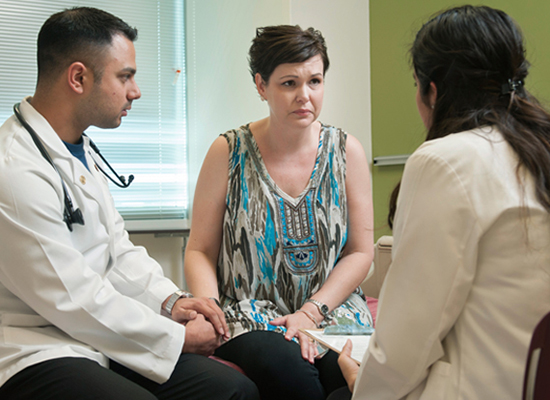Saving lives one cancer screening at a time


Ask a woman to list her life’s priorities and chances are her personal needs, including her own health, will fall far down the list (if they even make the list at all). But it’s important; after all, caring for their own health needs is the best way of ensuring the well-being of loved ones. This is especially true in the case of rural and minority women residing in low-income areas with limited access to regular health care.
With a $1.5 million grant from the Cancer Prevention and Research Institute of Texas (CPRIT), the Texas A&M Health Science Center is working to educate women on the importance of regular health assessments by improving access to breast and cervical cancer screenings, free human papilloma virus (HPV) vaccines to prevent cervical cancer, and follow-up diagnostic services for uninsured and underserved women in the nine Texas counties of the Brazos Valley. Working with community leaders, health resource networks and ministerial alliances, the grant team began providing services to the public in March 2014.
Leading this effort is the Texas Cancer Screening, Training, Education and Prevention (C-STEP) evidence-based program co-led by Jane Bolin, B.S.N., J.D., Ph.D., professor at the Texas A&M Health Science Center School of Public Health, and David McClellan, M.D., and Anna Lichorad, M.D., assistant professors at the Texas A&M College of Medicine. The program provides hands-on practice for family medicine residents and nursing students in a simulated environment, as well as clinical experiences at the Texas A&M Physicians Family Medicine Center. The program is also educating public health students in breast and cervical cancer-related activities and disease management strategies. When appropriate, promotores (bilingual community health workers) are used as patient navigators.
“We have successfully developed a national model for translating cancer prevention, screening, and education services into family medicine residency training while supporting patients through the complex health care system,” Bolin said. “With the help of this project we will not only increase patient awareness, but improve family medicine, nursing and public health practices along the entire cancer care continuum.”
McClellan added, “The long-term aim of the project is to reduce breast and cervical cancer incidence and related deaths, and achieving this goal is dependent on raising awareness about this program among community members and receiving referrals for age-eligible women or those at-risk.” A doctor’s referral is not required and individuals can self-refer.
According to Texas A&M School of Public Health employee Janet Helduser, M.A., program manager for the CPRIT grant, rural and medically underserved areas of Texas, including those in the Brazos Valley, have demonstrated higher rates of breast and cervical cancer than the state average, making community outreach all the more important. The grant makes available screening services for up to 680 women per year, advanced diagnostics, if needed, for more than 200 women per year, and up to 110 HPV vaccine doses annually.
At a recent back-to-school health fair, local resident Mary Jimenez was pleased to learn of the prevention services.
“Today we received not only information for our children, but for ourselves. I even brought my mom and we both signed up for free mammograms,” Jimenez said.
This program is putting a dent in the critical unmet need for breast and cervical cancer screening and prevention activities in the nine-county region of central Texas; saving women’s lives and transforming health profession’s education one cancer screening at a time. For more information, contact jwhelduser@sph.tamhsc.edu.
Media contact: media@tamu.edu


